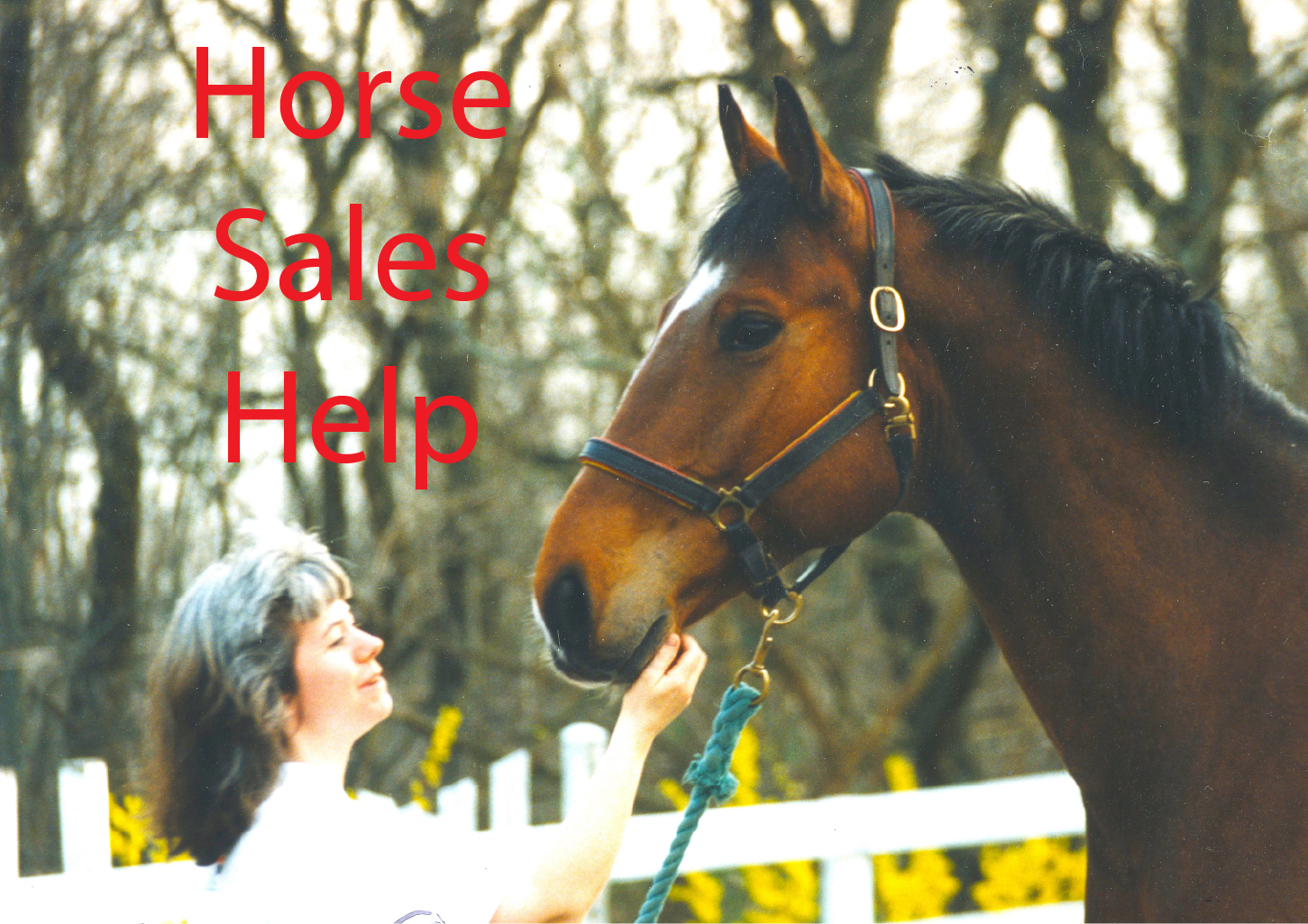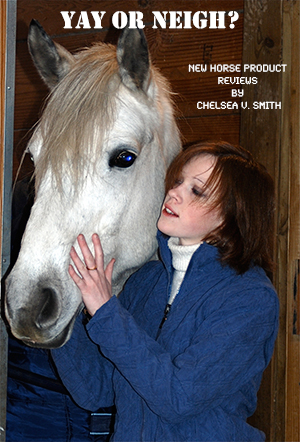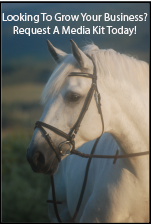Horse Sales Help
By Nikki Alvin-Smith

Horse sales are a great way to earn extra income for your horse business. As a trainer you can buy a horse, develop its skills, and produce a good finished result that will hopefully sell for more than its original purchase price.
There are a few pitfalls you need to avoid to be successful in developing this aspect of your business.
Start With A Sound Horse
This may sound obvious but at times many of us have unrealistic expectations of what soundness issues we can overcome and resolve with good medical attention and correct schooling. If you are buying a horse for resale then you want to start with a thorough veterinary pre-purchase exam to rule out any major flaws in soundness. If you have been given a horse for free you know that you must also look at the soundness carefully, because there are added costs each month to keep and care for the horse while you develop it for sale. These costs need to be recovered, which won’t happen if the horse won’t hold up to either the workload or to a thorough pre-purchase exam at sale time.
Be Realistic
It is all too easy to find a horse and fall in love. You must employ some self-discipline. If you set out to buy a talented Thoroughbred for resale as an event horse, then buy an older Quarterhorse with no get up and go, just because you thought he was cute, is not helpful. If you doubtful about a particular horse always follow your gut instinct and pass on the purchase. Do not be overwhelmed by smart sales chatter.
 It is also important not to overpay for the horse in the first place. You must allow for adding in costs of care, transport, plus your all-important training time, marketing, insurance into the final sale price of the horse. The quickest way to undo your financial benefit is by overpaying for the horse in the first place. Avoid making emotional decisions. Stay logical and on point, and do not hurry to buy a horse because of the seller’s claims of interest in the horse (either real or imagined). If this horse doesn’t work out, there will always be another one. You don’t regret the horses you don’t buy.
It is also important not to overpay for the horse in the first place. You must allow for adding in costs of care, transport, plus your all-important training time, marketing, insurance into the final sale price of the horse. The quickest way to undo your financial benefit is by overpaying for the horse in the first place. Avoid making emotional decisions. Stay logical and on point, and do not hurry to buy a horse because of the seller’s claims of interest in the horse (either real or imagined). If this horse doesn’t work out, there will always be another one. You don’t regret the horses you don’t buy.
It is also important to market your horses for a realistic price. Do your due diligence on the current market pricing before you shop. If a deal sounds too good to be true it probably is! In the beginning your budget for purchasing sale horses may be small and thus the opportunities for big profits are also small. Everyone started somewhere and there is nothing wrong with making a relatively narrow profit on a horse as long as you have done your math homework and there is a margin for profit. The more talent the horse has innately obviously means the more likelihood that the profit will be larger when the horse is further trained but the initial cost will be higher too.
It is also wise to budget in some dollars for unexpected expenses such as minor damage or injury requiring lay up, additional medical care or tack that may be needed to fit a particular horse. Look at the whole picture when you do your math.
Know When to Cut Your Losses
While many horses can be brought around to being a good riding horse in due course, remember that you have no magic wand. You actually may not be the best trainer for any particular horse for a variety of reasons; your talents; your method of training; your temperament and fit with the horse; your demands may be too high or too low; the horse may simply not ‘gel’ with you.
If you find your new sales prospect simply is not progressing well and on target, and that the job you laid out for him is not a good fit, then cut your losses and sell him and move on to another one. As a trainer you do not have endless time to work on every horse. Your time is money. While all horses are individuals and will come along in their own time, a resale horse is a horse you have purchased for profit.
Additionally if you discover the horse is unfit, unsound or unable to do the task at hand, there is no point in prolonging the agony. Cut your losses. As you develop your sales horse program you will make up these losses. You will never regret making the best decision for the horse.
Honesty and Integrity
If you sully your reputation by trying to ‘pass off’ horses to others as sound when they are not; obedient when they are not; trained when they are not, then the marketplace will soon let you know. Your reputation is extremely important. You should want to be transparent in your dealings. You should want to become known as a great resource for a good horse. This is brand-building time for you as a trainer and for your business. Not time to make a quick buck at someone else’s expense. Try to make a good match for horse and rider in every sale. You will be rewarded down the line by earning the respect and repeat business of other riders and trainers.

Commissions
It is very important that you are clear with all concerned parties in any sale transaction if commissions are being charged, paid or you are collecting a commission. It is standard for a trainer who is putting the time in to search for a horse for a client, to charge their client a commission based on the sale price of the horse.
If you are asked to ‘up’ the price of the horse, to give the trainer an additional commission or to enter into any agreement to pay money out of the sale to anyone, then you should disclose this arrangement to the purchaser or simply say ‘no’. Dishonest dealings of others can flood into your business profile if you are not diligent. You alone maintain your own ethics and standards.
When you are selling a horse if you are offered an additional commission by the buyer’s trainer for your help in ‘persuading’ their client the horse is suitable when indeed you know it is not, be aware that not only is this morally wrong, it can also come back to haunt you in the form of a lawsuit.
Additionally be aware that if you present a horse dishonestly e.g. the horse is medicated to disguise lameness, or you don’t disclose vices such as cribbing, you are opening yourself up to a lawsuit.
On the other side of the equation, you can charge a commission on your horse sales as a seller if you are finding a buyer for a horse that has been consigned to you for training. If you take horses in on consignment, be aware that some states e.g. New York, require a special license for you to become a ‘dealer’ of horses. You should also include costs for additional insurance requirements that may be necessary. Talk to your insurance agent to ensure you have the coverage you need for your individual situation.
In conclusion it is smart to utilize your talents to develop horses for sale as an added income to your business, especially if you have a stall standing unused. Whether you resell these horses to your existing clientele or market to the outside world, always operate in an honest manner.
Be certain that you always provide a bill of sale and which at a minimum should include:-
· Sold ‘where is’, ‘as is’, clause.
· Be certain there are no liens or encumbrances on the horse.
· Be sure of the identity of the horse and accurately describe the horse.
· Should be signed and executed by all concerned parties and dated.
· Full terms of sale including price and waivers e.g. ‘ no warranties express or implied.’
· That you recommended the purchaser complete a pre-purchase exam, whether they chose this option or not.
It is wise to consult with an attorney for a full disclosure of the terms that should be included to protect your business and personal assets. Keep copies of all transactions neatly filed away.
If you keep a clean paper trail, accurate records and operate in an honest and professional manner at all times, you will be in a better position to defend yourself from any lawsuits or issues down the road.
See you at the rail!
About the author: Nikki Alvin-Smith is an international Grand Prix dressage trainer/clinician who has competed in Europe at the Grand Prix level earning scores of over 72%. Together with her husband Paul, who is also a Grand Prix rider, they operate a private horse breeding/training farm in Stamford, NY.


